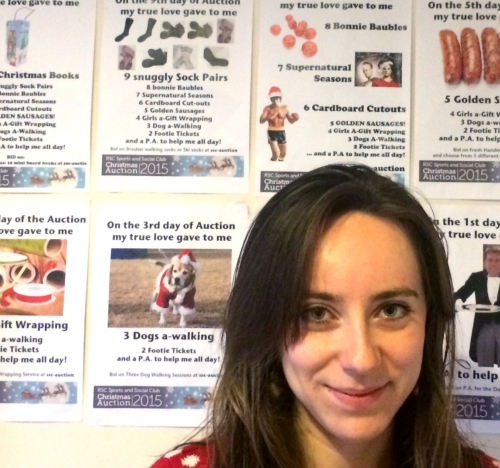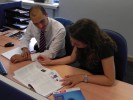 There are many projects and activities to become involved with alongside a day-to-day role at the RSC. Publishing Editor Kathryn Gempf explains her involvement as Chair of the RSC Sports and Social Club's charity Auction.What’s the Auction?
There are many projects and activities to become involved with alongside a day-to-day role at the RSC. Publishing Editor Kathryn Gempf explains her involvement as Chair of the RSC Sports and Social Club's charity Auction.What’s the Auction?
A wonderful RSC Sports and Social Club tradition! Held just before Christmas, it’s an eBay style, computer based auction for RSC staff in aid of East Anglia’s Children’s Hospice. The 2015 Auction raised over a whopping £4000.
What were the lots?
We ask staff, local businesses, not-so-local businesses and celebrities for donations. Lots received ranged from tickets to the FA semi-finals to a luxury Christmas hamper. We also asked staff members to make ‘promises’ which again came through in all sorts of forms: promises to deliver home-made cake to your desk every Monday for a month, to a staff member donating a day of his holiday to become the lucky winner’s P.A. for that day!
How did I get involved?
As I’m sure you can read from the surrounding blog posts here, there are so many fun opportunities for extra projects or responsibilities alongside the job description here at the RSC. Having always loved social activities I joined the Sports and Social Club Committee almost immediately after starting my job as a Publishing Editor in January 2015. It was through this that the 2015 auction chair role came up around October, and I jumped at the chance.
Why is it so great?
The whole thing was so much fun. I loved getting to know the building (storing our lots in secret cupboards and the attic), the experience of managing a project and team, and getting to know so many wonderful people from across the organisation. However, my personal highlight was absolutely going to town with our ‘Auction live’ advertising campaign, including getting the choir to perform a flash concert of the ’12 Days of Auction’ 1 hour before closing the bidding.
I’m so pleased to be part of such a fun and generous community and can't wait to see what projects the future brings.
Kathryn is working as a Publishing Editor in the General Chemistry team, in the Royal Society of Chemistry's Publishing Department. To see if there are any current vacancies in Publishing click here.
